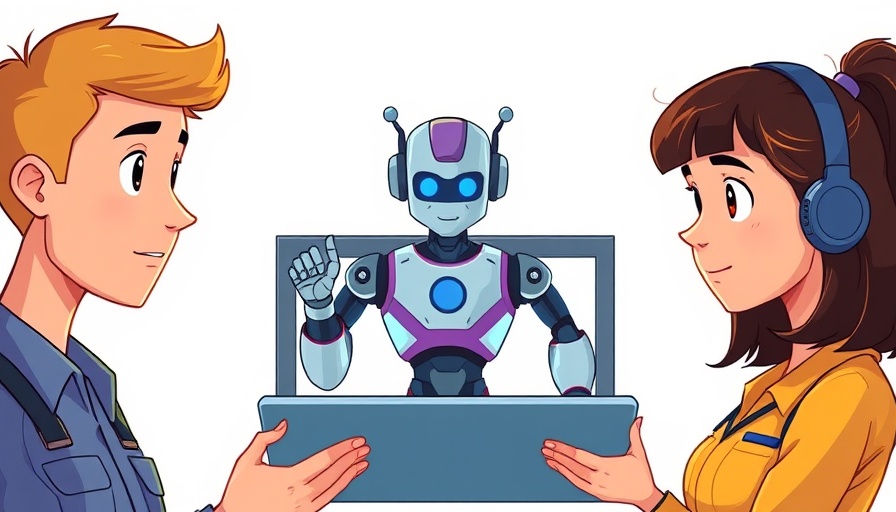
AI Transformation in the Workforce: The Emerging Landscape
As artificial intelligence (AI) continues to redefine industries, young workers aged 20 to 30 are finding themselves at the center of a transformative wave in the job market. The analysis conducted by Goldman Sachs highlights a troubling trend: this demographic has experienced a nearly 3% increase in unemployment since early 2024, outpacing the overall unemployment rate and emphasizing an urgent need for adaptive strategies from business leaders.
Understanding the Displacement of Entry-Level Jobs
Goldman Sachs outlines a clear message: the rise of AI technologies significantly threatens entry-level positions, particularly in tech, where roles are most susceptible to automation. As companies embrace AI, they often turn to technology to handle routine and lower-skilled tasks, resulting in a workforce shift that favors more experienced professionals, thereby leaving many young workers vulnerable to layoffs.
Impending Job Market Realities
The implications are staggering. Goldman Sachs estimates that AI could displace 6% to 7% of jobs across the U.S. within the next decade. Jan Hatzius, Chief Economist at Goldman Sachs, predicts an increase in the overall unemployment rate of only 0.5%. However, for young workers entering their careers, navigating the future job market is fraught with uncertainty as traditional pathways are disrupted.
The Broader Picture: Industry-Wide Disruptions
According to Challenger, Gray & Christmas, technical advancements attributed to AI have already led to over 27,000 job cuts in the private sector since 2023. Industry leaders, including Dario Amodei, CEO of AI startup Anthropic, forecast dramatic shifts where half of all entry-level white-collar jobs could be eliminated, creating a chilling possibility of up to 20% unemployment within this age group.
Expert Opinions on AI and Employment
Warnings from leading figures in AI shape a critical narrative. Geoffrey Hinton, known as the 'Godfather of AI,' raises alarms about the replacement of less complex intellectual tasks, igniting essential conversations on workforce readiness and adaptability. These insights shed light on a crucial aspect of AI's growth: the urgent need for human capital to evolve alongside technological progress.
Finding Opportunity in Adversity: The Potential for New Roles
While the prospects appear grim, history reminds us that technological innovation also creates new job categories. Just like past industrial revolutions prompted the development of entirely new sectors, today's advancements in AI present opportunities for roles in AI management, ethics, and maintenance. Entrepreneurs should seize the moment to develop training programs aligned with these emerging needs.
Preparing for a New Era in Employment
As businesses adjust to the realities of an AI-driven market, proactive measures become vital for survival. Understanding the nuanced effects of AI on workforce dynamics can empower organizations to reimagine their talent acquisition strategies and prepare for shifts in operational needs. Adaptability and foresight will be essential qualities for business leaders navigating this evolving terrain.
Essential Insights for Business Leaders
Maximizing business resilience in the face of AI disruption requires not only a grasp of current trends but also an actionable plan. Here are vital strategies for sustaining your business:
- Invest in Training: Develop programs that equip young employees with skills relevant to the evolving job market.
- Enhance Productivity: Integrate automation transparently to improve employee productivity without sacrificing jobs.
- Improve Employee Retention: Focus on creating a supportive company culture and engage younger workers eager for collaboration and innovation.
Final Thoughts
The rise of AI presents both challenges and unprecedented opportunities for the workforce, especially for younger individuals. It is critical for business leaders to not only recognize the shift but also to adapt their strategies proactively, build sustainable operations, and prepare for a transformative future. As entrepreneurs and executives, the responsibility to innovate and create an environment for growth rests on your shoulders.
For those ready to navigate the complexities of the current business landscape, take action now toward creating robust strategies that will future-proof your organization amidst the buzzing tide of AI. Explore how to launch initial projects, engage your team, and craft a business plan that fosters both innovation and stability.
 Add Row
Add Row  Add
Add 




Write A Comment